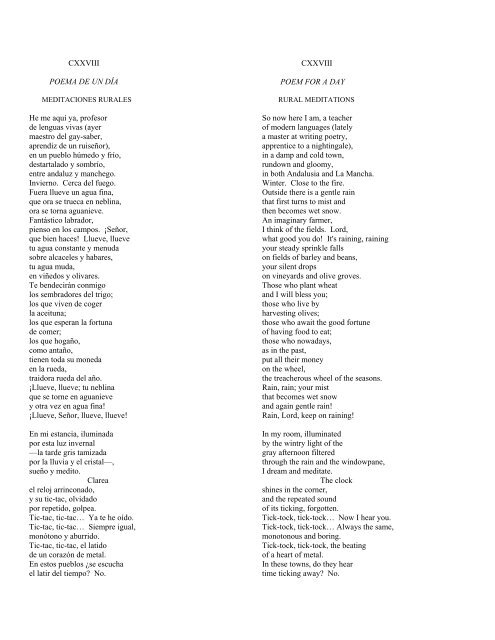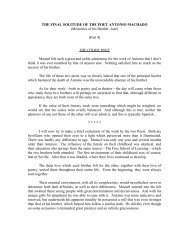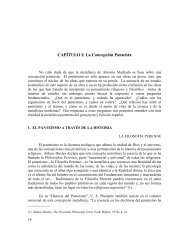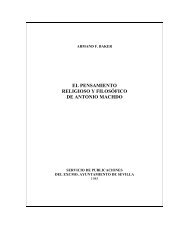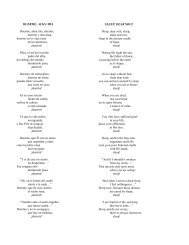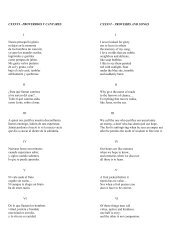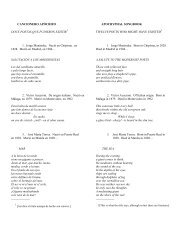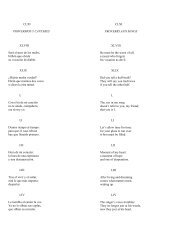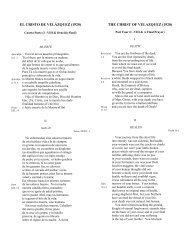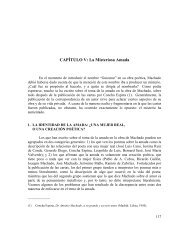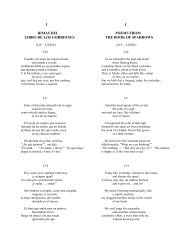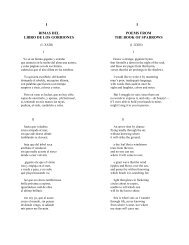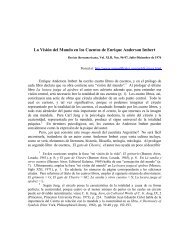CXXVIII POEMA DE UN DÍA He me aquí ya ... - Armand F. Baker
CXXVIII POEMA DE UN DÍA He me aquí ya ... - Armand F. Baker
CXXVIII POEMA DE UN DÍA He me aquí ya ... - Armand F. Baker
You also want an ePaper? Increase the reach of your titles
YUMPU automatically turns print PDFs into web optimized ePapers that Google loves.
<strong>CXXVIII</strong><br />
<strong>POEMA</strong> <strong>DE</strong> <strong>UN</strong> <strong>DÍA</strong><br />
MEDITACIONES RURALES<br />
<strong>He</strong> <strong>me</strong> <strong>aquí</strong> <strong>ya</strong>, profesor<br />
de lenguas vivas (ayer<br />
maestro del gay-saber,<br />
aprendiz de un ruiseñor),<br />
en un pueblo hú<strong>me</strong>do y frío,<br />
destartalado y sombrío,<br />
entre andaluz y manchego.<br />
Invierno. Cerca del fuego.<br />
Fuera llueve un agua fina,<br />
que ora se trueca en neblina,<br />
ora se torna aguanieve.<br />
Fantástico labrador,<br />
pienso en los campos. ¡Señor,<br />
que bien haces! Llueve, llueve<br />
tu agua constante y <strong>me</strong>nuda<br />
sobre alcaceles y habares,<br />
tu agua muda,<br />
en viñedos y olivares.<br />
Te bendecirán conmigo<br />
los sembradores del trigo;<br />
los que viven de coger<br />
la aceituna;<br />
los que esperan la fortuna<br />
de co<strong>me</strong>r;<br />
los que hogaño,<br />
como antaño,<br />
tienen toda su moneda<br />
en la rueda,<br />
traidora rueda del año.<br />
¡Llueve, llueve; tu neblina<br />
que se torne en aguanieve<br />
y otra vez en agua fina!<br />
¡Llueve, Señor, llueve, llueve!<br />
En mi estancia, iluminada<br />
por esta luz invernal<br />
—la tarde gris tamizada<br />
por la lluvia y el cristal—,<br />
sueño y <strong>me</strong>dito.<br />
Clarea<br />
el reloj arrinconado,<br />
y su tic-tac, olvidado<br />
por repetido, golpea.<br />
Tic-tac, tic-tac… Ya te he oído.<br />
Tic-tac, tic-tac… Siempre igual,<br />
monótono y aburrido.<br />
Tic-tac, tic-tac, el latido<br />
de un corazón de <strong>me</strong>tal.<br />
En estos pueblos ¿se escucha<br />
el latir del tiempo? No.<br />
<strong>CXXVIII</strong><br />
POEM FOR A DAY<br />
RURAL MEDITATIONS<br />
So now here I am, a teacher<br />
of modern languages (lately<br />
a master at writing poetry,<br />
apprentice to a nightingale),<br />
in a damp and cold town,<br />
rundown and gloomy,<br />
in both Andalusia and La Mancha.<br />
Winter. Close to the fire.<br />
Outside there is a gentle rain<br />
that first turns to mist and<br />
then beco<strong>me</strong>s wet snow.<br />
An imaginary far<strong>me</strong>r,<br />
I think of the fields. Lord,<br />
what good you do! It's raining, raining<br />
your steady sprinkle falls<br />
on fields of barley and beans,<br />
your silent drops<br />
on vine<strong>ya</strong>rds and olive groves.<br />
Those who plant wheat<br />
and I will bless you;<br />
those who live by<br />
harvesting olives;<br />
those who await the good fortune<br />
of having food to eat;<br />
those who nowadays,<br />
as in the past,<br />
put all their money<br />
on the wheel,<br />
the treacherous wheel of the seasons.<br />
Rain, rain; your mist<br />
that beco<strong>me</strong>s wet snow<br />
and again gentle rain!<br />
Rain, Lord, keep on raining!<br />
In my room, illuminated<br />
by the wintry light of the<br />
gray afternoon filtered<br />
through the rain and the windowpane,<br />
I dream and <strong>me</strong>ditate.<br />
The clock<br />
shines in the corner,<br />
and the repeated sound<br />
of its ticking, forgotten.<br />
Tick-tock, tick-tock… Now I hear you.<br />
Tick-tock, tick-tock… Always the sa<strong>me</strong>,<br />
monotonous and boring.<br />
Tick-tock, tick-tock, the beating<br />
of a heart of <strong>me</strong>tal.<br />
In these towns, do they hear<br />
ti<strong>me</strong> ticking away? No.
En estos pueblos se lucha<br />
sin tregua con el reló,<br />
con esa monotonía<br />
que mide un tiempo vacío.<br />
Pero ¿tu hora es la mía?<br />
¿Tu tiempo, reloj, el mío?<br />
(Tic-tic, tic-tic…) Era un día<br />
(tic-tic, tic-tic) que pasó,<br />
y lo que yo más quería<br />
la muerte se lo llevó.<br />
Lejos suena un clamoreo<br />
de campanas…<br />
Arrecia el repiqueteo<br />
de la lluvia en las ventanas.<br />
Fantástico labrador,<br />
vuelvo a mis campos. ¡Señor,<br />
cuánto te bendecirán<br />
los sembradores del pan!<br />
Señor, ¿no es tu lluvia ley,<br />
en los campos que ara el buey,<br />
y en los palacios del rey?<br />
¡Oh agua buena, deja vida<br />
en tu huida!<br />
¡Oh tú, que vas gota a gota,<br />
fuente a fuente y río a río,<br />
como ese tiempo de hastío<br />
corriendo a la mar remota,<br />
con cuanto quiere nacer,<br />
cuanto espera<br />
florecer<br />
al sol de la primavera,<br />
sé piadosa,<br />
que mañana<br />
serás espiga temprana,<br />
prado verde, carne rosa,<br />
y más: razón y locura<br />
y amargura<br />
de querer y no poder<br />
creer, creer y creer!<br />
Anochece;<br />
el hilo de la bombilla<br />
se enrojece,<br />
luego brilla,<br />
resplandece<br />
poco más que una cerilla.<br />
Dios sabe dónde andarán<br />
mis gafas… Entre librotes,<br />
revistas y papelotes,<br />
¿quién las encuentra?... Aquí están.<br />
Libros nuevos. Abro uno<br />
de Unamuno.<br />
In these towns they struggle<br />
relentlessly with the clock,<br />
with the monotony<br />
that <strong>me</strong>asures a ti<strong>me</strong> that is empty.<br />
But are your hours really mine?<br />
Is your ti<strong>me</strong>, clock, really mine?<br />
(Tick-tick…) On a day<br />
(tick-tick) that has passed,<br />
death took away the thing<br />
that I loved the most.<br />
In the distance the pealing<br />
of bells…<br />
The patter of rain<br />
beats stronger on the windows.<br />
An imaginary far<strong>me</strong>r,<br />
I return to my fields. Lord,<br />
how those who sow wheat<br />
will bless you!<br />
Lord, isn't the rain your law,<br />
in the fields plowed by the ox,<br />
and in the palaces of a king?<br />
Oh, blessed water, leave life<br />
behind as you flow!<br />
Oh, you that flows drop by drop,<br />
fountain to fountain and river to river,<br />
like this ti<strong>me</strong> of boredom<br />
flowing to the distant sea,<br />
with all that wants to be born,<br />
everything that waits<br />
to flourish<br />
under the spring sun,<br />
be <strong>me</strong>rciful,<br />
for tomorrow<br />
you will be a new ear of grain,<br />
a green <strong>me</strong>adow, rosy flesh,<br />
and more: reason and madness<br />
and the bitterness<br />
of wanting and failing<br />
to believe, believe and believe!<br />
Night is falling;<br />
the light of the lamp<br />
turns red,<br />
then shines,<br />
and glows<br />
not much more than a matchstick.<br />
God only knows where<br />
my glasses are… In all these books,<br />
magazines and paperwork,<br />
who could find them?... <strong>He</strong>re they are.<br />
New books. I open one<br />
by Unamuno.
¡Oh, el dilecto,<br />
predilecto<br />
de esta España que se agita,<br />
porque nace o resucita!<br />
Siempre te ha sido ¡oh Rector<br />
de Salamanca!, leal<br />
este humilde profesor<br />
de un instituto rural.<br />
Esa tu filosofía<br />
que llamas diletantesca,<br />
voltaria y funambulesca,<br />
gran don Miguel, es la mía.<br />
Agua del buen manantial,<br />
siempre viva,<br />
fugitiva;<br />
poesía, cosa cordial.<br />
¿Constructora?<br />
—No hay cimiento<br />
ni en el alma ni en el viento—.<br />
Bogadora,<br />
marinera,<br />
hacia la mar sin ribera.<br />
Enrique Bergson: Los datos<br />
in<strong>me</strong>diatos<br />
de la conciencia. ¿Esto es<br />
otro embeleco francés?<br />
Este Bergson es un tuno;<br />
¿verdad maestro Unamuno?<br />
Bergson no da como aquel<br />
Immanuel<br />
el volatín inmortal;<br />
este endiablado judío<br />
ha hallado el libre albedrío<br />
dentro de su <strong>me</strong>chinal.<br />
No está mal:<br />
cada sabio, su problema,<br />
y cada loco, su tema.<br />
Algo importa<br />
que en la vida mala y corta<br />
que llevamos<br />
libres o siervos seamos;<br />
mas, si vamos<br />
a la mar,<br />
lo mismo nos han de dar.<br />
¡Oh, esto pueblos! Reflexiones,<br />
lecturas y acotaciones<br />
pronto dan en lo que son:<br />
bostezos de Salomón.<br />
¿Todo es<br />
soledad de soledades,<br />
vanidad de vanidades,<br />
que dijo el Eclesiastés?<br />
Mi paraguas, mi sombrero,<br />
mi gabán… El aguacero<br />
amaina… Vámonos pues.<br />
Oh, the dearly beloved<br />
favorite<br />
of this Spain that frets<br />
because it is born or reborn!<br />
This humble teacher<br />
at a rural high school<br />
has always admired you,<br />
oh Rector of Salamanca.<br />
This philosophy of yours<br />
that you call amateurish,<br />
Voltarian and acrobatic,<br />
is mine as well, great Don Miguel.<br />
Water from a pure source,<br />
always vital<br />
flowing on;<br />
poetry, a thing of the heart.<br />
Is it constructive?<br />
—there is no solid ground,<br />
not in the soul nor in the wind.<br />
Oarsman,<br />
sailor,<br />
toward the boundless sea.<br />
<strong>He</strong>nri Bergson: The Im<strong>me</strong>diate<br />
Data<br />
of Consciousness. Is this<br />
another French deception?<br />
This Bergson is a rascal,<br />
isn't that right, Master Unamuno?<br />
Bergson has never made<br />
a leap of faith like that<br />
Immanuel;<br />
that bedeviled Jew<br />
has discovered free will<br />
inside his putlog hole.<br />
Not bad at all:<br />
every sage has his problem<br />
and each madman, his obsession.<br />
After all, it matters<br />
whether, in this sad and short<br />
life we lead,<br />
we are free or enslaved;<br />
but then, if we all<br />
end up in the sea,<br />
it's all the sa<strong>me</strong> to us.<br />
Oh, these people! Their ruminations,<br />
studies and quotations<br />
soon reveal what they really are:<br />
the <strong>ya</strong>wns of Solomon.<br />
Is everything<br />
solitude of solitudes,<br />
vanity of vanities,<br />
like Ecclesiastes said?<br />
My umbrella, my hat,<br />
my raincoat… The downpour<br />
is letting up… So let's get going.
Es de noche. Se platica<br />
al fondo de una botica.<br />
—Yo no sé,<br />
don José,<br />
como son los liberales<br />
tan perros, tan inmorales.<br />
—¡Oh, tranquilícese usté!<br />
Pasados los carnavales,<br />
vendrán los conservadores,<br />
buenos administradores<br />
de su casa.<br />
Todo llega y todo pasa.<br />
Nada eterno:<br />
ni gobierno<br />
que perdure,<br />
ni mal que cien años dure.<br />
—Tras esos tiempos vendrán<br />
otros tiempos y otros y otros,<br />
y lo mismo que nosotros<br />
otros se jorobarán.<br />
Así es la vida, don Juan.<br />
—Es verdad, así es la vida.<br />
—La cebada está crecida.<br />
—Con estas lluvias…<br />
Y van<br />
las habas que es un primor.<br />
—Cierto; para marzo, en flor.<br />
Pero la ecarcha, los hielos…<br />
—Y además, los olivares<br />
están pidiendo a los cielos<br />
agua a torrentes.<br />
A mares.<br />
Las fatigas, los sudores<br />
que pasan los labradores!<br />
En otro tiempo…<br />
Llovia<br />
también cuando Dios quería.<br />
—Hasta mañana, señores.<br />
Tic-tac, tic-tac… Ya pasó<br />
un día como otro día,<br />
dice la monotonía<br />
del reló.<br />
Sobre mi <strong>me</strong>sa Los datos<br />
de la conciencia, in<strong>me</strong>diatos.<br />
No está mal<br />
este yo funda<strong>me</strong>ntal,<br />
contingente y libre, a ratos,<br />
creativo, original;<br />
este yo que vive y siente<br />
dentro la carne mortal<br />
¡ay! por saltar impaciente<br />
las bardas de su corral.<br />
Baeza, 1913.<br />
It's nightti<strong>me</strong>. People are chatting<br />
in the back of a store.<br />
"I don't know,<br />
don José,<br />
how these liberals can be<br />
so rotten, so immoral."<br />
"Oh, take it easy!<br />
After Mardi Gras<br />
the Conservatives will return,<br />
and they know how to keep<br />
their house in order.<br />
Everything co<strong>me</strong>s and goes.<br />
Nothing is eternal:<br />
no govern<strong>me</strong>nt<br />
that endures,<br />
no evil that lasts forever."<br />
"After these ti<strong>me</strong>s, others<br />
will co<strong>me</strong>, and then on and on,<br />
and just like us<br />
others will be ruined.<br />
That's life, don Juan."<br />
"It's true, that's the way life is."<br />
"The barley is getting ripe."<br />
"With all this rain…<br />
And the beans<br />
are really excellent."<br />
"Yes, only March, and already in boom.<br />
But then frost, or late freezes…"<br />
"And besides, the olive trees<br />
are praying to heaven for<br />
more and more rain.<br />
A real downpour.<br />
Ah, the trials and tribulations<br />
that far<strong>me</strong>rs must go through!<br />
In the old days…<br />
It also<br />
used to rain when God willed it."<br />
"Until tomorrow, gentle<strong>me</strong>n."<br />
Tick-tock, tick-tock… A day<br />
has passed like any other,<br />
says the monotony<br />
of the clock.<br />
On my desk, The Im<strong>me</strong>diate<br />
Data of Consciousness.<br />
That's not bad,<br />
this essential self,<br />
contingent and free, so<strong>me</strong>ti<strong>me</strong>s<br />
creative, original;<br />
this self that lives and feels<br />
inside its mortal flesh,<br />
alas, the urge to jump over<br />
the fence of its corral.<br />
Baeza, 1913.
CXXIX<br />
NOVIEMBRE 1913<br />
Un año más. El sembrador va echando<br />
la semilla en los surcos de la tierra.<br />
Dos lentas yuntas aran,<br />
mientras pasan las nubes cenicientas<br />
ensombreciendo el campo,<br />
las pardas se<strong>me</strong>nteras,<br />
los grises olivares. Por el fondo<br />
del valle el río el agua turbia lleva.<br />
Tiene Cazorla nieve,<br />
y Mágina, tor<strong>me</strong>nta,<br />
su montera, Aznaitín. Hacia Granada,<br />
montes con sol, montes de sol y piedra.<br />
CXXX<br />
LA SAETA<br />
¿Quién <strong>me</strong> presta una escalera<br />
para subir al madero,<br />
para quitarle los clavos<br />
a Jesús el Nazareno?<br />
¡Oh, la saeta, el cantar<br />
al Cristo de los gitanos,<br />
siempre con sangre en las manos,<br />
siempre por desenclavar!<br />
¡Cantar del pueblo andaluz<br />
que todas las primaveras<br />
anda pidiendo escaleras<br />
para subir a la cruz!<br />
¡Cantar de la tierra mía<br />
que echa flores<br />
al Jesús de la agonía,<br />
y es la fe de mis mayores!<br />
¡No puedo cantar, ni quiero<br />
a ese Jesús del madero,<br />
sino al que anduvo en el mar!<br />
SAETA POPULAR<br />
CXXIX<br />
NOVEMBER 1913<br />
Another year. The sower is casting<br />
seeds in the furrows of the ground.<br />
Two slow teams of oxen are plowing<br />
while gray clouds pass by<br />
casting shade on the countryside,<br />
the brown cultivated fields,<br />
the gray olive groves. In the bottom<br />
of the valley muddy water flows in the river.<br />
Cazorla has snow,<br />
and Mágina, a storm,<br />
Aznaitín, her cap. Off toward Granada,<br />
mountains with sun, mountains with sun and stone.<br />
CXXX<br />
THE SAETA<br />
Who will give <strong>me</strong> a ladder<br />
to climb up the cross<br />
and take out the nails<br />
from Jesus the Nazarene?<br />
Oh, the saeta, the song<br />
that gypsies sing to the Christ,<br />
always with blood on his hands,<br />
always with no nails taken out!<br />
The song that people in Andalusia<br />
sing each spring, when they<br />
ask for a ladder<br />
to climb up the cross!<br />
Song of my ho<strong>me</strong>land<br />
that offers praise<br />
to a Jesus that suffers,<br />
and is the faith of my elders!<br />
I can not, and will not sing<br />
to that Jesus on the cross,<br />
but to the one who walked on the sea!<br />
A TRADITIONAL "SAETA"
CXXXI<br />
<strong>DE</strong>L PASADO EFÍMERO<br />
Este hombre del casino provinciano,<br />
que vio a Carancha recibir un día,<br />
tiene mustia la tez, el pelo cano,<br />
ojos velados de <strong>me</strong>lancolía;<br />
bajo el bigote gris, labios de hastío,<br />
y una triste expresión, que no es tristeza,<br />
sino algo más y <strong>me</strong>nos: el vacío<br />
del mundo en la oquedad de su cabeza.<br />
Aún luce de corinto terciopelo<br />
chaqueta y pantalón abotinado,<br />
y un cordobés color de cara<strong>me</strong>ro,<br />
pulido y torneado.<br />
Tres veces heredó; tres ha perdido<br />
al monte su caudal; dos ha enviudado.<br />
Sólo se anima ante el azar prohibido,<br />
sobre el verde tapete reclinado,<br />
o al evocar la tarde de un torero,<br />
la suerte de un tahúr, o si alguien cuenta<br />
la hazaña de un gallardo bandolero,<br />
o la proeza de un matón sangrienta.<br />
Bosteza de política banales<br />
dicterios al gobierno reacionario,<br />
y augura que vendrán los liberales,<br />
cual torna la cigüeña al campanario.<br />
Un poco labrador, del cielo aguarda<br />
y al cielo te<strong>me</strong>; alguna vez suspira,<br />
pensando en su olivar, y al cielo mira<br />
con ojo inquieto, si la lluvia tarda.<br />
Lo demás, taciturno, hipocondríaco,<br />
prisionero en la Arcardia del presente,<br />
le aburre; sólo el humo del tabaco<br />
simula algunas sombras en su frente.<br />
Este hombre no es de ayer ni es de mañana,<br />
sino de nunca; de la cepa hispana<br />
no es el fruto maduro ni podrido,<br />
es una fruta vana<br />
de aquella España que pasó y no ha sido,<br />
esa que hoy tiene la cabeza cana.<br />
CXXXI<br />
ABOUT THE EPHEMERAL PAST<br />
This man in the provincial casino,<br />
who once saw Carancha fight a bull,<br />
has wrinkled skin, gray hair,<br />
and eyes veiled by <strong>me</strong>lancholy;<br />
turned-down lips under a gray mustache<br />
make a sad expression that is not sadness<br />
but so<strong>me</strong>thing both more and less: a world<br />
of empty space in the cavity of his head.<br />
<strong>He</strong> still wears a jacket of Corinthian<br />
velvet and high-fronted trousers,<br />
and a cara<strong>me</strong>l-colored Cordoba hat,<br />
finely textured and well-rounded.<br />
Three ti<strong>me</strong>s he inherited, and each ti<strong>me</strong> lost<br />
his wealth at cards; he was twice a widower.<br />
<strong>He</strong> is only roused by prohibited ga<strong>me</strong>s,<br />
leaning over the green gaming table,<br />
or on recalling the day of a bullfight,<br />
the luck of a gambler, or if so<strong>me</strong>one<br />
recounts the exploits of a dashing bandit,<br />
or the skill of a bloodthirsty assassin.<br />
<strong>He</strong> <strong>ya</strong>wns at the politics and trivial<br />
insults of the reactionary govern<strong>me</strong>nt,<br />
and predicts that the liberals will return,<br />
like the stork co<strong>me</strong>s back to its bell tower.<br />
A part ti<strong>me</strong> far<strong>me</strong>r, he waits for good weather<br />
and fears the bad, and he sighs, thinking<br />
of his olive grove, and looks at the sky<br />
uneasily when the rain is delayed.<br />
Everything else bores him: pessimistic and<br />
glum, he is a prisoner in so<strong>me</strong> imaginary<br />
Arcadia; only the smoke of his tobacco gives<br />
the impression of shadows on his forehead.<br />
This man is neither of the past nor the future,<br />
but of never; of the Hispanic race,<br />
he is not the mature nor the rotten fruit;<br />
his is a useless fruit<br />
of that Spain which has ended and has never begun,<br />
the sa<strong>me</strong> one whose head today is gray.
CXXXII<br />
LOS OLIVOS<br />
¡Viejos olivos sedientos<br />
bajo el claro sol del día,<br />
olivares polvorientos<br />
del campo de Andalucia!<br />
¡El campo andaluz, peinado<br />
por el sol canicular,<br />
de loma en loma ra<strong>ya</strong>do<br />
de olivar y de olivar!<br />
¡Son las tierras<br />
soleadas,<br />
anchas lomas, lueñes sierras<br />
de olivares recamadas!<br />
Mil senderos. Con sus machos,<br />
abrumados de capachos,<br />
van gañanes y arrieros.<br />
¡De la venta del camino<br />
a la puerta, soplan vino<br />
trabucaires bandoleros!<br />
¡Olivares y olivares<br />
de loma en loma prendidos<br />
cual bordados alamares!<br />
¡Olivares coloridos<br />
de una tarde anaranjada;<br />
olivares rebruñidos<br />
bajo la luna argentada!<br />
¡Olivares centellados<br />
en las tardes cenicientas,<br />
bajo los cielos preñados<br />
de tor<strong>me</strong>ntas!...<br />
Olivares, Dios os dé<br />
los eneros<br />
de aguaceros,<br />
los agostos de agua al pie;<br />
los vientos primaverales,<br />
vuestras flores racimadas;<br />
y las lluvias otoñales,<br />
vuestras olivas moradas.<br />
Olivar, por cien caminos,<br />
tus olivitas irán<br />
caminando a cien molinos.<br />
Ya darán<br />
trabajos en las alquerías<br />
a gañanes y braceros,<br />
¡oh buenas frentes sombrías<br />
bajo los anchos sombreros!...<br />
A Manolo Ayuso.<br />
CXXXII<br />
OLIVE TREES<br />
Thirsty old olive trees<br />
in the clear light of day,<br />
dusty olive groves<br />
in the land of Andalusia!<br />
The Andalusian land, combed<br />
by the hot sum<strong>me</strong>r sun,<br />
hill after hill lined with<br />
rows of olive trees!<br />
They are sunlit<br />
hills,<br />
broad ridges, long mountain ranges<br />
decorated with olive groves!<br />
Down a thousand paths, co<strong>me</strong><br />
farmhands and muleteers,<br />
their mules loaded with baskets.<br />
By the door of the<br />
roadside inn, rebel<br />
soldiers drink wine!<br />
Olive grove after olive grove<br />
covering every hilltop<br />
like embroidered gar<strong>me</strong>nts!<br />
Olive groves colored orange<br />
by the afternoon sunlight;<br />
olive groves burnished<br />
by silvery moonlight!<br />
Olive groves sparkling<br />
on gray afternoons<br />
under a sky pregnant<br />
with storms!...<br />
Olive groves, may God<br />
grant you Januarys<br />
with downpours,<br />
Augusts with ground water;<br />
spring winds for your<br />
flowering branches,<br />
and autumn rains for<br />
your blue-green olives.<br />
Olive grove, your tiny olives<br />
will travel down a hundred roads<br />
to a hundred mills.<br />
This will give<br />
jobs on the farms<br />
to workers and field hands,<br />
oh, good dark brows<br />
under the wide sombreros!...<br />
For Manolo Ayuso.
Olivar y olivareros,<br />
bosque y raza,<br />
campo y plaza<br />
de los fieles al terruño<br />
y al arado y al molino,<br />
de los que muestran el puño<br />
al destino,<br />
los benditos labradores,<br />
los bandidos caballeros,<br />
los señores<br />
devotos y matuteros!...<br />
¡Ciudades y caseríos<br />
en la margen de los ríos,<br />
en los pliegues de la sierra!...<br />
¡Venga Dios a los hogares<br />
y a las almas de esta tierra<br />
de olivares y olivares!<br />
II<br />
A dos leguas de Úbeda, la Torre<br />
de Pero Gil, bajo este sol de fuego,<br />
triste burgo de España. El coche rueda<br />
entre grises olivos polvorientos.<br />
Allá el castillo heroico.<br />
En la plaza <strong>me</strong>ndigos y chicuelos:<br />
una orgía de harapos…<br />
Pasamos frente al atrio del convento<br />
de la Misericordia.<br />
¡Los blancos muros, los cipreses negros!<br />
¡Agria <strong>me</strong>lancolía<br />
como asperón de hierro<br />
que raspa el corazón! ¡Amurallada<br />
piedad, erguida en este basurero!...<br />
Esta casa de Dios, decid, hermanos,<br />
esta casa de Dios, ¿qué guarda dentro?<br />
Y ese joven,<br />
asombrado y atento<br />
que parece mirarnos con la boca,<br />
será el loco del pueblo,<br />
de quien se dice: es Lucas,<br />
Blas o Ginés, el tonto que tenemos.<br />
Seguimos. Olivares. Los olivos<br />
están en flor. El carricoche lento,<br />
al paso de dos pencos matalones,<br />
camina hacia Peal. Campos ubérrimos.<br />
La tierra da lo suyo; el sol trabaja;<br />
el hombre es para el suelo;<br />
genera, siembra y labra<br />
y su fatiga unce la tierra al cielo.<br />
Olive grove and trees,<br />
forest and race,<br />
field and plaza<br />
of those dedicated to the land,<br />
to the plow and to the mill,<br />
of those who shake their fist<br />
at destiny,<br />
the blessed far<strong>me</strong>rs,<br />
the gentle<strong>me</strong>n bandits,<br />
the lordly<br />
followers and traffickers!...<br />
Cities and hamlets<br />
on the bank of the rivers,<br />
in the folds of the mountains!...<br />
God bless the hearths<br />
and the souls of this land<br />
of olive groves and trees.<br />
II<br />
Two leagues from Ubeda, is La Torre<br />
de Pero Gil, a sad Spanish town sitting<br />
under the hot sun. The coach rolls<br />
through dusty gray olive trees.<br />
There the heroic castle.<br />
In the plaza beggars and children:<br />
an orgy of rags…<br />
We pass by a court<strong>ya</strong>rd belonging<br />
to the convent of Mercy.<br />
White walls and black cypresses!<br />
Bitter Melancholy<br />
like a steel grindstone<br />
that chafes the heart! Walled-in<br />
piety, standing in this dung heap!...<br />
This house of God, tell <strong>me</strong>, brothers,<br />
what is there in this house of God?<br />
And this wonder-stricken<br />
and attentive young man<br />
who looks at us with an open mouth<br />
must be the village idiot<br />
of whom it is said: he is Lucas,<br />
Blas or Ginés, that fool of ours.<br />
We go on. Olive groves. The olive trees<br />
are in bloom. The slow moving coach<br />
rolls on toward Peal, pulled by two<br />
worn-out old horses. Plenteous fields.<br />
The land gives its own; the sun works;<br />
man is for the soil;<br />
he procreates, sows and toils<br />
and his fatigue binds the earth to heaven.
Nosotros enturbiamos<br />
la fuente de la vida, el sol pri<strong>me</strong>ro,<br />
con nuestros ojos tristes,<br />
con nuestro amargo rezo,<br />
con nuestra mano ociosa,<br />
con nuestro pensamiento<br />
—se engendra en el pecado,<br />
se vive en el dolor. ¡Dios está lejos!—.<br />
Esta piedad erguida (This piety rising up)<br />
sobre ese burgo sórdido, sobre este basurero,<br />
esta casa de Dios, decid, ¡oh santos<br />
cañones de von Kluck!, ¿qué guarda dentro?<br />
CXXXIII<br />
LLANTO <strong>DE</strong> LAS VIRTU<strong>DE</strong>S Y COPLAS<br />
POR LA MUERTE <strong>DE</strong> DON GUIDO<br />
Al fin, una pulmonía<br />
mató a don Guido, y están<br />
las campanas todo el día<br />
doblando por él. ¡Din-dan!<br />
Murió don Gido, un señor,<br />
de mozo muy jaranero,<br />
muy galán y algo torero;<br />
de viejo, gran rezador.<br />
Dicen que tuvo un serrallo<br />
este señor de Sevilla;<br />
que era diestro<br />
en manejar el caballo,<br />
y un maestro<br />
en refrescar manzanilla.<br />
Cuando <strong>me</strong>rmó su riqueza,<br />
era su monomanía<br />
pensar que pensar debía<br />
en asentar la cabeza.<br />
Y asentóla<br />
de una manera española,<br />
que fue casarse con una<br />
doncella de gran fortuna;<br />
y repintar sus blasones,<br />
hablar de las tradiciones<br />
de su casa,<br />
a escándalos y amoríos<br />
poner tasa,<br />
sordina a sus desvaríos.<br />
We muddy<br />
the fountain of life, the first sun,<br />
with our sad eyes,<br />
with our bitter prayers,<br />
with our idle hands,<br />
with our thoughts<br />
—we give birth in sin,<br />
we live in pain. God is far away!<br />
This piety rising up<br />
over this sordid town, over this dung heap,<br />
this house of God, tell <strong>me</strong>, oh holy<br />
canons of von Kluck!: what is there inside it?<br />
CXXXIII<br />
LAMENT FOR THE VIRTUES AND BALLAD<br />
OF THE <strong>DE</strong>ATH OF DON GUIDO<br />
It was pneumonia that finally<br />
killed Don Guido and now<br />
the bells are tolling for him<br />
all day long. Ding-dong!<br />
Don Guido died, a gentleman<br />
who was real carouser as a youth,<br />
very gallant and fond of bullfights;<br />
as an old man, he prayed a lot.<br />
They say he owned a brothel,<br />
this man from Seville<br />
who was very skillful<br />
in handling a horse<br />
and an expert<br />
at tippling sherry.<br />
When his money dwindled<br />
it beca<strong>me</strong> his obsession<br />
to think he ought to think<br />
about settling down.<br />
And he settled<br />
in a typically Spanish way,<br />
which was to marry<br />
a rich young maiden<br />
and repaint his coat of arms,<br />
speak about the importance<br />
of his family na<strong>me</strong>,<br />
and put a damper<br />
on his scandals and reveling.
Gran pagano<br />
se hizo hermano<br />
de una santa cofradía;<br />
el Jueves Santo salía,<br />
llevando un cirio en la mano<br />
—¡aquel trueno!—,<br />
vestido de nazareno.<br />
Hoy nos dice la campana<br />
que han de llevarse mañana<br />
al buen don Guido, muy serio,<br />
camino del ce<strong>me</strong>nterio.<br />
Buen don Guido,<br />
<strong>ya</strong> eres ido<br />
y para siempre jamas…<br />
Alguien dirá: ¿Qué dejaste?<br />
Yo pregunto: ¿Qué llevaste<br />
al mundo donde hoy estás?<br />
¿Tu amor a los alamares<br />
y a las sedas y a los oros,<br />
y a la sangre de los toros<br />
y al humo de los altares?<br />
Buen don Guido y equipaje,<br />
buen viaje!...<br />
El acá<br />
y el allá,<br />
caballero,<br />
se ve en tu rostro marchito<br />
lo infinito:<br />
cero, cero.<br />
¡Oh las enjutas <strong>me</strong>jillas,<br />
amarillas,<br />
y los párpados de cera,<br />
y la fina calavera<br />
en la almohada del lecho!<br />
¡Oh fin de una aristocracia!<br />
La barba canosa y lacia<br />
sobre el pecho;<br />
<strong>me</strong>tido en tosco sa<strong>ya</strong>l,<br />
las yertas manos en cruz,<br />
¡tan formal!<br />
el caballero andaluz.<br />
That great pagan<br />
beca<strong>me</strong> a <strong>me</strong>mber<br />
of a holy order;<br />
on Holy Thursday he e<strong>me</strong>rged<br />
carrying a candle in his hand<br />
—that rascal!—<br />
dressed as a penitent.<br />
Today the bell tells us<br />
that tomorrow they will carry<br />
good Don Guido, very formal,<br />
to the ce<strong>me</strong>tery.<br />
Good Don Guido,<br />
now you are gone<br />
for ever and ever…<br />
So<strong>me</strong> might wonder what you left behind.<br />
I ask: What did you take with you<br />
to the world where you are now?<br />
Was it your love for orna<strong>me</strong>nts<br />
and for silk and gold,<br />
and for the blood of the bulls<br />
and for the smoke of the altars?<br />
Good Don Guido and baggage,<br />
have a good trip!...<br />
Caballero,<br />
the near<br />
and the far,<br />
the infinite shows<br />
in your wizened face:<br />
zero, zero.<br />
Oh, the sunken yellow<br />
cheeks,<br />
and the waxy eyelids,<br />
and the elegant skull<br />
on the pillow of his deathbed!<br />
Oh, end of an aristocracy!<br />
The faded gray beard<br />
over his breast;<br />
dressed in a crude cassock,<br />
his stiff hands in a cross<br />
—so formal!—<br />
the Andalusian gentleman.
CXXXIV<br />
LA MUJER MANCHEGA<br />
La Mancha y sus mujeres… Argamansilla, Infantes,<br />
Esquivias, Valdepeñas. La novia de Cervantes,<br />
y del manchego heroico, el ama y la sobrina<br />
(el patio, la alacena, la cueva y la cocina,<br />
la rueca y la costura, la cuna y la pitanza).<br />
la esposa de don Diego y la mujer de Panza,<br />
bajo la tierra, y tantas que son y que serán<br />
la hija del ventero, y tantas como están<br />
encanto de manchegos y madres de españoles<br />
por tierras de lagares, molinos y arreboles.<br />
Es la mujer manchega garrida y bien plantada,<br />
muy sobre sí, doncella, perfecta de casada.<br />
El sol de la caliente llanura vinariega<br />
quemó su piel, mas guarda frescura de bodega<br />
su corazón. Devota, sabe rezar con fe<br />
para que Dios nos libre de cuanto no se ve.<br />
Su obra es la casa—<strong>me</strong>nos celada que en Sevilla,<br />
más gineceo y <strong>me</strong>nos castillo que en Castilla—.<br />
Y es del hogar manchego la musa ordenadora;<br />
alinea los vasares, los lienzos alcanfora;<br />
las cuentas de la plaza anota en su diario,<br />
cuenta garbanzos, cuenta las cuentas del rosario.<br />
¿Hay más? Por estos campos hubo un amor de fuego.<br />
Dos ojos abrasaron un corazón manchego.<br />
¿No tuvo en esta Mancha su cuna Dulcinea?<br />
¿No es el Toboso patria de la mujer ideal<br />
del corazón, engendro e imán de corazones,<br />
a quien varón no impregna y aún parirá varones?<br />
Por esta Mancha—prados, viñedos y molinos—<br />
que so el igual del cielo iguala sus caminos,<br />
de cepas arrugadas en el tostado suelo<br />
y mustios pastos como raído terciopelo;<br />
por este seco llano de sol y lejanía,<br />
en donde el ojo alcanza su pleno <strong>me</strong>diodía<br />
(un diminuto bando de pájaros puntea<br />
el indigo del cielo sobre la blanca aldea;<br />
y allá se yergue un soto de verdes alamillos,<br />
tras leguas y más leguas de campos amarillos),<br />
por esta tierra, lejos del mar y la montaña,<br />
el ancho reverbero del claro sol de España,<br />
anduvo un pobre hidalgo ciego de amor un día<br />
—amor nublóle el juicio; su corazón veía—.<br />
CXXXIV<br />
WOMAN OF LA MANCHA<br />
La Mancha and its wo<strong>me</strong>n… Argamansilla, Infantes,<br />
Esquivias, Valdepeñas. The sweetheart of Cervantes<br />
and the man from La Mancha, the mistress and the niece<br />
(the patio, the cupboard, the cellar and the kitchen,<br />
the distaff and the sewing, the cradle and the food),<br />
the wife of Don Diego and of Sancho Panza,<br />
all those wo<strong>me</strong>n who are and will be in this land,<br />
the innkeeper's daughter, and all those who charm<br />
the <strong>me</strong>n of La Mancha and are mothers of Spaniards<br />
in the land of wine presses, mills and rouge boxes.<br />
The woman of La Mancha is good-looking and sturdy,<br />
sure of herself, a maid who is the perfect housewife.<br />
The sun of the torrid wine-growing plains<br />
burned her skin, but her heart holds the freshness<br />
of a wine cellar. Devoted, she know how to pray<br />
that God will free us from all that is unknown.<br />
<strong>He</strong>r work is the house—less jealous than in Seville,<br />
more feminine and less restricted than in Castile.<br />
She arranges things in a typical La Mancha ho<strong>me</strong>;<br />
she arranges the shelves, puts mothballs in the linen;<br />
she keeps track of the grocery bills in her diary,<br />
she counts the chick-peas, and the beads of her rosary.<br />
Is there more? This land held an all-consuming love.<br />
Two eyes set a heart on fire in La Mancha.<br />
Was not La Mancha the birthplace of Dulcinea?<br />
Is not El Toboso the ho<strong>me</strong> of the sweetheart and<br />
ideal woman, the embryo and char<strong>me</strong>r of hearts,<br />
never impregnated by a man and yet will give birth?<br />
<strong>He</strong>re in La Mancha—<strong>me</strong>adows, vine<strong>ya</strong>rds, mills—<br />
where the roads of the land match those of heaven,<br />
of wrinkled vine stocks on the scorched ground<br />
and withered pastures like faded velvet;<br />
through this dry plateau of sun and distance<br />
where the eye can see from horizon to horizon<br />
(a tiny flock of birds dots<br />
the indigo sky above the white village;<br />
and over there is a grove of small green poplars,<br />
and beyond miles and miles of yellow fields),<br />
through this land, far from the sea and mountains,<br />
under the bright light of the clear Spanish sun,<br />
walked a poor hidalgo blinded by love one day<br />
—love clouded his reason; his heart saw clearly.
Y tú, la cerca y lejos, por el in<strong>me</strong>nso llano<br />
eterna compañera y estrella de Quijano,<br />
lozana labradora fincada en sus terrones<br />
—oh madre de manchegos y nu<strong>me</strong>n de visiones—,<br />
viviste, buena Aldonza, tu vida verdadera,<br />
cuando tu amante erguía su lanza justiciera,<br />
y en tu casona blanca ahechando el rubio trigo.<br />
Aquel amor de fuego era por ti y contigo.<br />
Mujeres de la Mancha, con el sagrado mote<br />
de Dulcinea, os salve la gloria de Quijote.<br />
And you, wherever you may be, on the im<strong>me</strong>nse<br />
plateau, eternal companion and polestar of Quijano,<br />
a healthy farm girl rooted in your fields<br />
—oh, mother of <strong>me</strong>n and spirit of visions—<br />
winnowing the wheat in your white village,<br />
good Aldonza, your true goal was fulfilled,<br />
when your beloved raised his righteous lance.<br />
That burning love was for you, and with you.<br />
Wo<strong>me</strong>n of La Mancha, with the sacred na<strong>me</strong><br />
of Dulcinea, may the glory of Quijote redeem you.
CXXXV<br />
EL MAÑANA EFÍMERO<br />
A Roberto Castrovido.<br />
La España de charanga y pandereta,<br />
cerrado y sacristía,<br />
devota de Frascuelo y de María,<br />
de espíritu burlón y de alma quieta,<br />
ha de tener su mármol y su día,<br />
su infalible mañana y su poeta.<br />
El vano ayer engendrará un mañana<br />
vacío y ¡por ventura! pasajero.<br />
Será un joven lechuzo y tarambana,<br />
un sayón con hechuras de bolero,<br />
a la moda de Francia realista,<br />
un poco al uso de París pagano,<br />
y al estilo de España especialista<br />
en el vicio al alcance de la mano.<br />
Esa España inferior que ora y bosteza,<br />
vieja y tahúr, zaragatera y triste;<br />
esa España inferior que ora y embiste,<br />
cuando se digna usar de la cabeza,<br />
aún tendrá luengo parto de varones<br />
amantes de sagradas tradiciones<br />
y de sagradas formas y maneras;<br />
florecerán las barbas apostólicas<br />
y otras calvas en otras calaveras<br />
brillarán, venerables y católicas.<br />
El vano ayer engendrará un mañana<br />
vacío, y ¡por ventura! pasajero,<br />
la sombra de un lechuzo tarambana,<br />
de un sayón con hechuras de bolero,<br />
el vacuo ayer dará un mañana huero.<br />
Como la náusea de un borracho ahíto<br />
de vino malo, un rojo sol corona<br />
de heces turbias las cumbres de granito;<br />
hay un mañana estomagante escrito<br />
en la tarde pragmática y dulzona.<br />
Mas otra España nace,<br />
la España del cincel y de la maza,<br />
con esa eterna juventud que se hace<br />
del pasado macizo de la raza.<br />
Una España implacable y redentora,<br />
España que alborea<br />
con un hacha en la mano vengadora,<br />
España de la rabia y de la idea.<br />
1913.<br />
CXXXV<br />
A FLEETING TOMORROW<br />
For Roberto Castrovido.<br />
The Spain of fanfares and tambourines,<br />
isolated and sacrosanct,<br />
worshiped by Frascuelo and Maria,<br />
with a mocking spirit and an inactive soul<br />
will have its monu<strong>me</strong>nt and its day,<br />
its infallible tomorrow and its poet.<br />
A vain yesterday will engender a tomorrow<br />
that is empty and—thank goodness!—temporary.<br />
It will be so<strong>me</strong> owlish young crackpot,<br />
a long cloak that looks like a bolero,<br />
following the French realistic mode,<br />
a little like the pagan fashions in Paris,<br />
and the Spanish style that specializes<br />
in any vice that happens to be at hand.<br />
This inferior Spain that prays and <strong>ya</strong>wns,<br />
old and crafty, quarrelso<strong>me</strong> and sad;<br />
this inferior Spain that prays and attacks<br />
when it condescends to use its head,<br />
for many long years will still give birth<br />
to <strong>me</strong>n who love the sacred traditions<br />
and the sacred forms and customs;<br />
apostolic beards will flourish<br />
and other bald pates will shine on<br />
other heads, venerable and catholic.<br />
A vain yesterday will engender a tomorrow<br />
that is empty and—thank goodness!—temporary,<br />
the shadow of an owlish young crackpot<br />
with a long cloak that looks like a bolero,<br />
an empty yesterday will give a hollow tomorrow.<br />
Like the vomit of man intoxicated by cheap<br />
wine, a red sun shines over<br />
the granite peaks of these murky dregs;<br />
there is an indigestible tomorrow written<br />
on the pragmatic and cloying afternoon.<br />
But another Spain is e<strong>me</strong>rging,<br />
the Spain of the chisel and the ham<strong>me</strong>r,<br />
with the eternal youth that is made<br />
from the solid past of the race.<br />
An implacable and redemptive Spain,<br />
a Spain that is dawning<br />
with an ax in her avenging hand,<br />
a Spain full of rage and bold ideas.<br />
1913.


